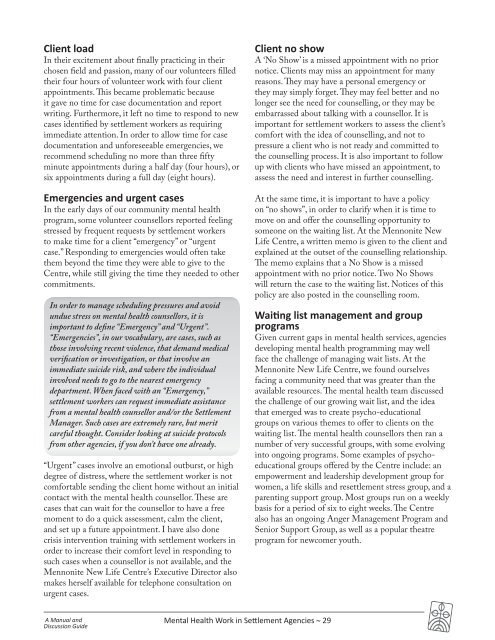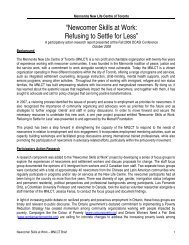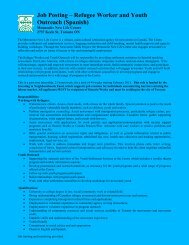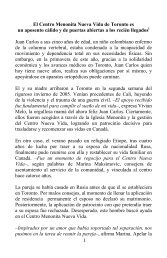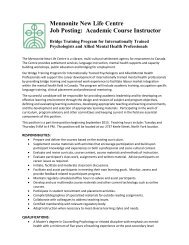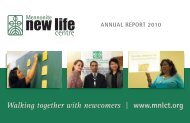Mentoring Internationally Trained Psychologists - Mennonite New ...
Mentoring Internationally Trained Psychologists - Mennonite New ...
Mentoring Internationally Trained Psychologists - Mennonite New ...
Create successful ePaper yourself
Turn your PDF publications into a flip-book with our unique Google optimized e-Paper software.
Client load<br />
In their excitement about finally practicing in their<br />
chosen field and passion, many of our volunteers filled<br />
their four hours of volunteer work with four client<br />
appointments. This became problematic because<br />
it gave no time for case documentation and report<br />
writing. Furthermore, it left no time to respond to new<br />
cases identified by settlement workers as requiring<br />
immediate attention. In order to allow time for case<br />
documentation and unforeseeable emergencies, we<br />
recommend scheduling no more than three fifty<br />
minute appointments during a half day (four hours), or<br />
six appointments during a full day (eight hours).<br />
Emergencies and urgent cases<br />
In the early days of our community mental health<br />
program, some volunteer counsellors reported feeling<br />
stressed by frequent requests by settlement workers<br />
to make time for a client “emergency” or “urgent<br />
case.” Responding to emergencies would often take<br />
them beyond the time they were able to give to the<br />
Centre, while still giving the time they needed to other<br />
commitments.<br />
In order to manage scheduling pressures and avoid<br />
undue stress on mental health counsellors, it is<br />
important to define “Emergency” and “Urgent”.<br />
“Emergencies”, in our vocabulary, are cases, such as<br />
those involving recent violence, that demand medical<br />
verification or investigation, or that involve an<br />
immediate suicide risk, and where the individual<br />
involved needs to go to the nearest emergency<br />
department. When faced with an “Emergency,”<br />
settlement workers can request immediate assistance<br />
from a mental health counsellor and/or the Settlement<br />
Manager. Such cases are extremely rare, but merit<br />
careful thought. Consider looking at suicide protocols<br />
from other agencies, if you don’t have one already.<br />
“Urgent” cases involve an emotional outburst, or high<br />
degree of distress, where the settlement worker is not<br />
comfortable sending the client home without an initial<br />
contact with the mental health counsellor. These are<br />
cases that can wait for the counsellor to have a free<br />
moment to do a quick assessment, calm the client,<br />
and set up a future appointment. I have also done<br />
crisis intervention training with settlement workers in<br />
order to increase their comfort level in responding to<br />
such cases when a counsellor is not available, and the<br />
<strong>Mennonite</strong> <strong>New</strong> Life Centre’s Executive Director also<br />
makes herself available for telephone consultation on<br />
urgent cases.<br />
A Manual and<br />
Discussion Guide<br />
Mental Health Work in Settlement Agencies ~ 29<br />
Client no show<br />
A ‘No Show’ is a missed appointment with no prior<br />
notice. Clients may miss an appointment for many<br />
reasons. They may have a personal emergency or<br />
they may simply forget. They may feel better and no<br />
longer see the need for counselling, or they may be<br />
embarrassed about talking with a counsellor. It is<br />
important for settlement workers to assess the client’s<br />
comfort with the idea of counselling, and not to<br />
pressure a client who is not ready and committed to<br />
the counselling process. It is also important to follow<br />
up with clients who have missed an appointment, to<br />
assess the need and interest in further counselling.<br />
At the same time, it is important to have a policy<br />
on “no shows”, in order to clarify when it is time to<br />
move on and offer the counselling opportunity to<br />
someone on the waiting list. At the <strong>Mennonite</strong> <strong>New</strong><br />
Life Centre, a written memo is given to the client and<br />
explained at the outset of the counselling relationship.<br />
The memo explains that a No Show is a missed<br />
appointment with no prior notice. Two No Shows<br />
will return the case to the waiting list. Notices of this<br />
policy are also posted in the counselling room.<br />
Waiting list management and group<br />
programs<br />
Given current gaps in mental health services, agencies<br />
developing mental health programming may well<br />
face the challenge of managing wait lists. At the<br />
<strong>Mennonite</strong> <strong>New</strong> Life Centre, we found ourselves<br />
facing a community need that was greater than the<br />
available resources. The mental health team discussed<br />
the challenge of our growing wait list, and the idea<br />
that emerged was to create psycho-educational<br />
groups on various themes to offer to clients on the<br />
waiting list. The mental health counsellors then ran a<br />
number of very successful groups, with some evolving<br />
into ongoing programs. Some examples of psychoeducational<br />
groups offered by the Centre include: an<br />
empowerment and leadership development group for<br />
women, a life skills and resettlement stress group, and a<br />
parenting support group. Most groups run on a weekly<br />
basis for a period of six to eight weeks. The Centre<br />
also has an ongoing Anger Management Program and<br />
Senior Support Group, as well as a popular theatre<br />
program for newcomer youth.


